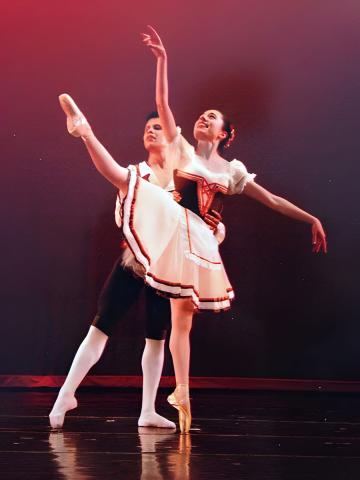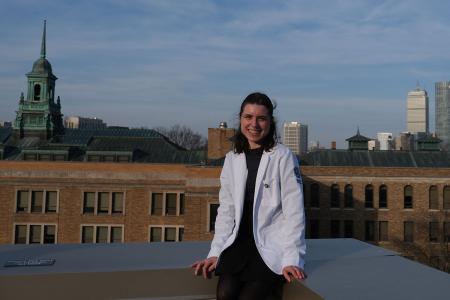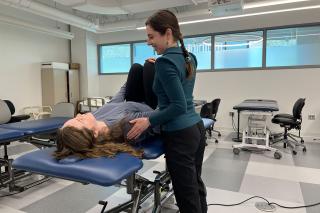Bringing a distinctive methodology to her profession, Amanda Michel ’23, ’25DPT has already made headlines, gracing the cover story of American Physical Therapy Association magazine (July 2024). We spoke with her about disability-informed research, her love of dance, and the supportive atmosphere of Simmons.
“Disability is not a tragedy … It’s just a normal part of life. Everybody will have a disability at some point,” says Amanda Michel ’23, ’25DPT, a student in the accelerated 3+3 Health and Exercise Science + Physical Therapy program. “Having a disability is neither a good or bad thing. It’s just neutral; it’s part of the human experience.” Accordingly, Michel refers to Autism Acceptance Month (April) as “Autism Appreciation Month.”
In July 2024, American Physical Therapy Association magazine interviewed Michel and other physical therapists (PTs) for a special feature, “Disability within the Physical Therapy Profession.” The article sparks an awareness of, and appreciation for, PTs with disabilities. “It ended up being a really great experience. The people featured alongside me are making wonderful contributions to our field. I’m really glad that this was the cover story,” she reflects.
Michel’s unique approach to the discipline of physical therapy draws from her lived experience. Around the age of two, she was diagnosed with Sensory Processing Disorder. Eventually, her diagnosis was corrected as autism, as well as ADHD. Though Michel’s childhood was punctuated by regular physical and occupational therapy services, her artistic endeavors ultimately motivated her to become a PT.
Finding her ‘Voice’ through Ballet
As a child, Michel was reluctant to engage in contact sports with fellow students. “My mom knew it would be too overwhelming for me, so she enrolled us in a ‘Mommy and Me’ ballet class,” she recounts.
Dancing became a life-long passion for Michel. “I loved ballet because it’s so organized and exacting … There is a right and a wrong way to do things,” she explains. “But it’s also an art, and I’ve always loved arts-based media, like writing, reading, and watching old movies.” Moreover, Michel found that dance was a healthy way for her to expend energy.

Dance enabled Michel to communicate with others in creative ways. “I don’t really think in words. Instead, I think more in terms of short movies, or even GIFs [i.e., graphics interchange format, as opposed to still images],” she explains. “With dance, I can just express myself with my body, which is a lot easier than translating mental images into words.”
Following her high school graduation, Michel danced professionally for three and a half years at the American Repertory Ballet (Princeton, NJ, which has since relocated to New Brunswick) and the Virginia National Ballet (Manassas, VA). She also served as a guest artist for Boston’s Urban Nutcracker.
Although Michel no longer performs, she continues her training in a less formal environment. “After taking a few years off of dancing during college and graduate school, I am now re-teaching myself ballet. With my Simmons PT training, I can approach this in a more anatomically correct way, which will help prevent injuries when I’m older.”
Accelerated Training and Personalized Mentoring at Simmons
While Michel was training and dancing professionally, she noticed a need for dance classes for children with disabilities. “The dance world is pretty ableist in general; there is a lot of stigma … I witnessed these students getting turned away by local studios, so there weren’t many opportunities for them [to take ballet],” she says.
Eventually, Michel took it upon herself to teach dance to students with disabilities. In Princeton and Manassas, she taught private classes, as well as an adaptive dance class at the Franciscan Children’s Hospital in Boston. Michel also created a syllabus for these classes. “I realized that I wanted to do more work with this population, and I knew that I needed to go to college for specialized training, and eventually PT school,” she says.

Seeking accelerated PT programs in the Boston area, Simmons caught Michel’s eye. “Simmons was very accommodating and willing to work around my schedule,” she notes. “I was taking more classes at certain times of the year, and they let me begin the program a semester late due to my Nutcracker [performance] schedule, so I really appreciated this flexibility.”
Furthermore, Michel felt at ease on campus. “The atmosphere at Simmons was more welcoming and less competitive or cutthroat than other accelerated PT programs.”
In the Department of Physical Therapy, Michel is grateful for faculty members’ mentorship and encouragement. In particular, Assistant Professor of Practice Rachel Verrill, Assistant Professor of Practice Jillian Kulinski, and Associate Professor of Practice Stacey Maguire have been especially influential.
“Rachel Verrill taught a very intensive course, ‘Advanced Human Anatomy’ [DPT 621] … One day, I was super stressed and cried in her office. But she was so supportive and helped me figure out study strategies that would work for me, and that really helped set me up for success in the program,” Michel recalls.
Kulinski, who also directs the DPT Clinical Education program, serves as Michel’s official advisor. She has been instrumental in helping Michel navigate the complex networks of communication within a clinical environment. Maguire supports Michel as the research advisor for her disability studies-related research, as well as serving as a mentor as she navigates school, research/presentations, and clinicals.
After completing the undergraduate portion of her program in 2023, Michel received the Charlotte Mae Morocco Leadership Award, named after the late Dean Emerita Morocco (1941–2023), a bold advocate for Simmons students. The award recognizes an individual “who has shown a strong commitment through positive contributions to the Simmons community … [and] is sensitive to the value of diversity within the Simmons community.”
Embracing a Disability Studies Approach to PT Research
With Associate Professor Maguire, Assistant Professor Winston Kennedy (Northeastern University), and several members of her Class of 2025 DPT cohort — Britney Bui-Tran, Lauren Kenney, Emily Sass, Miki Shibuya, and Libby Taylor — Michel is working on a research project entitled “Perceptions of Individuals with Disabilities Regarding Therapeutic Alliance with Physical Therapists: A Qualitative Analysis.”
As she explains, “We conducted focus groups with individuals who have disabilities, all of whom had been treated by PTs. Approximately half of these individuals had been treated by a PT with a disability. Our team wanted to get a sense of what their experiences were, what their relationship with their PT was like, and if this relationship was impacted by their PT’s disability status.”
Michel and her collaborators found that people with disabilities generally had positive experiences with clinicians with disabilities. People who had clinicians without disabilities also shared positive experiences, but the few negative experiences that participants shared involved instances of miscommunication and misunderstanding from PTs without disabilities. “Those grievances were based on the feeling that their clinicians did not fully understand their disability, so they felt that their PTs could not relate to them,” Michel says.
The study concluded that PTs with disabilities may help improve certain patient experiences and outcomes. “‘Therapeutic alliance’ is the term we use in healthcare,” Michel explains. “It’s a very important, but often overlooked, element of successful patient care. Essentially, your relationship with your clinician can be just as, or even more healing than what the clinician is actually doing … So, there is a positive aspect to being a PT with a disability.”
Michel and her collaborators aim to publish this study within the next year. Since this initial study involved a sample size that is too small to generalize the results vis-à-vis the larger population, Michel hopes to initiate larger, follow-up studies.
Additionally, Michel has a forthcoming publication in the Journal of Humanities in Rehabilitation. This article, co-authored with PT students from other institutions, is based on an earlier panel discussion held at the Shirley Ryan AbilityLab in Chicago last summer. During this event, Michel and a group of PT students with disabilities discussed how to recruit and support PTs with disabilities, and how this diversification is beneficial to their field as a whole.
Making Healing Fun
As part of her final clinical rotation, Michel is currently interning at the Children’s Hospital of Philadelphia, where she serves as a PT clinical student. Engaging her creative faculties, Michel makes children’s hospitalizations and healing journeys more enjoyable.
“For example, a popular thing I like to do with them is to blow up medical gloves into a balloon. Then we can play volleyball together, using the hospital bed as a volleyball net,” she explains. “I basically try to think of fun activities that the patients can enjoy in a confined hospital space.”
For Michel, it is especially rewarding to implement her PT training in ways that help children with disabilities. “I know what it’s like, and I am motivated to help them.”

